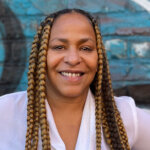How can we have courageous conversations?
Farra Trompeter, co-director, is joined by Nneka Allen, Camila Pereira, and Nicole Salmon, co-editors of Collecting Courage: Joy, Pain, Freedom, Love, a collection of lived experiences written by 15 accomplished Black North American fundraisers in the United States and Canada, to discuss how nonprofit staff can push for more honest, kind, clear, and direct conversations with their colleagues.
Transcript
Farra Trompeter: Welcome to the Smart Communications podcast. This is Farra Trompeter, co-director and worker-owner at Big Duck. Today we’re gonna ask the question, how can we have courageous conversations? Our guests today are co-editors of “Collecting Courage: Joy, Pain, Freedom, Love“, a book that came out in 2021 that I first learned about via The Ethical Rainmaker podcast when Michelle Shireen Muri interviewed one of today’s guests, Nneka Allen. I’ve since purchased the book for myself and for several other friends and colleagues and highly recommend it to anyone out there who works in nonprofits and with nonprofits. It is a must-read. So let me officially introduce you to today’s guests. We have Nneka, Nicole, and Camila, and they, in addition to creating this amazing book that came out several years ago, have continued to provide learning and training through the Collecting Courage website and initiative to help people who wanna advance racial justice in the charitable sector.
Farra Trompeter: Nneka Allen is a Black Afro-Metis Canadian woman, a Mama, and a descendant of the Underground Railroad. Through the Empathy Agency Incorporated, she coaches leaders and their teams about how to cultivate environments where everyone belongs. Our second guest is Nicole Salmon. Nicole brings extensive experience working in the nonprofit charitable sector as a curious leader and fund development strategist. She’s founder of Boundless Philanthropy, a values-led consultancy committed to building and sustaining healthy, equitable, well-resourced mission and community-focused nonprofit and charitable organizations. As a poet and writer, she taps the power of words and language to stir emotions, liberate, connect, and bridge divides. Finally, we’re joined by Camila Pereira. Camila is a senior nonprofit professional in Toronto, Canada. Originally from Brazil, she’s been involved in philanthropy since childhood through her family’s community initiatives. Camila’s career in the charitable sector is a means to contribute to the creation of more equitable and inclusive spaces. Nneka, Nicole, Camila, welcome to the show.
Nneka, Nicole, Camila: Hey, Farra great to be here. Good to be here.
Farra Trompeter: So exciting. A chorus of amazing women. Well, let’s start with the book. There may be folks out there who have not yet read this book. I cannot continue to endorse it enough. And for those folks who’ve not read it or perhaps read it a few years ago, I’m wondering, maybe let’s start with you Camila. Can you share a little bit about what led you all to create this book? Maybe talk a little bit about it and any other interesting results that have come since you first published Collecting Courage?
Camila Pereira: Yes, sure.Thank you for having us. What I’ll do is I’ll share the genesis story of our book and some of the work that we’ve been developing based on it. So “Collecting Courage: Joy, Pain, Freedom, Love” was launched on November 25th, 2020. The year 2020 will most likely be remembered for two significant events. First, the COVID-19 pandemic and the murder of Mr. George Floyd. Prior to and during the time all this was happening, a project called Our Right to Heal, organized by my sister Nneka, which featured 10 stories, Canadian-based Black female fundraisers that was initially set to be published by AFP Global in January 2020, got pushed back and this project was released within a day of Mr. Floyd’s death. Out of confluence of events and network, in June 2020, the opportunity to create and publish a book about the experiences of Black fundraisers culminated with the Collecting Courage book that was published in Canada in November 2020. And the US version of the book was published in September 2021.
Camila Pereira: Our book is really a collection of personal experiences written by 15 accomplished Black North American fundraisers, being five in the United States and 10 in Canada. It is really filled with personal testimonies and it documents racism, survival, and also speaks to the journey of asserting Black identity in all white work environments. The themes, joy, pain, freedom, love. It came about organically through plenty of brainstorming, and it’s really about capturing the feelings that we go through in our journey in the charitable sector. So all of the ups and downs and growth and hopes. What we did in the collection is really to focus on elevating Black voices and empowering Black-lived experiences. As we worked with the book and we shared with the larger audience a question that we were, and we are still often asked is what now?
Camila Pereira: So what can we do in the pursuit of racial justice and to bring about social change? So a year ago in January 2023, to me it was just the other day, and I’m talking about a year ago, we launched A Path to Action; a journey towards Collecting Courage, which is a training and learning curriculum, which was specifically designed to respond to the question, what now? This learning resource, it’s really meant to reimagine the possibilities of a racially just society, develop an awareness of self-examine personal habits, behaviors, and actions, and understand how they all intersect and connect with the collective and transformative movement toward racial justice. So this is just a little bit about how our book came to be and the work that we’ve been doing since 2020 with my two sisters, Nicole and Nneka.
Farra Trompeter: Wonderful, thank you so much. Well, one of the things that really struck me most when I was reading Collecting Courage was just how real and authentic the contributors were in sharing their stories. And I know as we were preparing for this call, we talked about that idea of being vulnerable. and Nicole, I’m just curious if you can speak to where is the power in being vulnerable and what are some ways you’ve seen that really shift narratives and create change?
Nicole Salmon: Thanks for the question, Farra. It’s really an interesting question to think about. So, you know, telling their stories required the contributors to confront two linked, but distinct experiences. First, it’s revisiting and reliving the experience or experiences, and second, it’s going public and sharing the story. The first is the sort of inward journey, and the latter is of course that external one. Our brother Mide Akerewusi described his journey in sharing his story in the book as being akin to an out-of-body experience, a sort of dissonance that the person going through experiences is indeed him, right? So he felt that sense of an outer body experience reading the story that he had actually captured. For me, I didn’t necessarily view my contribution as an exercise about the power of vulnerability, especially in the ways power is perceived and displayed. My decision to share my story had to do with where I was at that time in my life. Within a seven year span, I would say, prior to the book coming out, I moved from being an employee to being an independent fundraising consultant.
Nicole Salmon: I was drawn into community with other Black fundraisers, Nneka, Camilla, and others. I experienced the loss of my mom, who was our family’s anchor, and a couple of younger family members were facing serious health challenges. I guess it was a time for personal reckoning where I felt called and compelled to act and sort of find some outlet for all the swirling emotions I was having at that time. The book and certainly the Our Right to Heal project that preceded it served as a release valve that I presented itself at a time where I felt the support around me, those people who were there supporting me, certainly my family, certainly Nneka and Camilla, Gail Pico, who was the, the publisher of the book, and certainly other people too.
Nicole Salmon: I felt that my story and our stories together would be part of a process of documenting and bearing witness to insidious experiences of anti-Black racism within the sector. Our narratives would challenge the unquestioned and inherent goodness of the sector by exposing racism, barriers, and exclusionary behaviors and practices. The shifts I’m observing are the growing voices of folks empowered to come forward to share their experiences. And though you can’t draw a causality, a line drawing, the fact that the book was released, and the fact that people are speaking out, I think the book was birthed during a period of revival when a very public reckoning was underway. That said, the reality is that accompanying this shift, we are observing a backlash where a number of folks who chose silence as the way to ride, what they saw as a momentary period of disruption, a number of folks decided that that was the time for them to go on their attack. Their intent is to reassert the status quo narrative through their counter-response, which was denying and questioning the validity of our experiences. Now, the thing with this is that we fully expected the snapback because we know that history foretells that anytime you have a period of disruption where people are prepared to challenge the way things are and calling for change, that there’s always a backlash. The beauty of it all is that history also foretells that our pursuit will continue and be unwavering.
Farra Trompeter: Yeah, I so appreciate that unwavering commitment that you three have, as well as those others who’ve told the story and worked with you in what you’ve been doing. And I know that you talk a lot about and help people build the skills to have courageous conversations with themselves, with their colleagues, with their family, you know, with those around them, and really to use those conversations to take more risks and how they communicate. And I’m curious, Nneka, how can staff within nonprofits push for more honest, kind, clear, and direct conversations with their colleagues? What does courageous conversations and taking more risks in how people communicate, what does that look like in the nonprofit world?
Nneka Allen: Thanks, Farra. I believe courageous conversations have to begin with leadership. I know your question sort of revolves around staff and leadership, I guess our staff, but typically when we think about staff, we’re not thinking necessarily about the people who are leading the organization, but I think that these types of conversations, courageous conversations, they have to be modeled and they have to be modeled by the people who are in charge so that the culture can be changed in an organization, right? This question is really about values and culture and the expression of them, and in practice. In my work, I see a direct correlation between the identity of a leader, their expression of their values in the organizational culture. So that I see this direct line tied between these two things. And so I believe courageous conversations require us to confront our understanding of, and our discomfort with conflict.
Nneka Allen: And conflict is not something we talk about all that much, especially in the charitable sector, right? We’re supposed to be “nice”, which sits, you know, in opposition to the notion of conflict as we know it sort of in mainstream society. So the questions that sort of circle around in my mind are the questions that I like to meditate on and talk to clients about is how do we inspire leaders to do this difficult work? How do we inspire leaders to begin to engage around questions of conflict? And then how are they held accountable for the way that they navigate conflict? So there’s that idea about, okay, how are we going to manage conflict? And then there’s the practice, right? We’re never quite ready for the practice of conflict. And so who’s holding leaders accountable in that space? I believe the motivation and accountability should be personally driven because if it’s not, then it’s a pressure, it’s an external pressure, and that’s rarely sustainable or rarely yields results that are long lasting. And so if it’s not personally driven, you will likely have leaders at some point who will refuse to grow. And so risking sometimes the organizational mission, sometimes team wellbeing, and then we’re now in another conflictual situation where our Boards must act, brings us right back to conflict again. So we must know what relationship we have with conflict, and we have to begin to dispel ourselves of the myths of its usefulness so that we can get down to these really crucial conversations that require and call us to more courage.
Farra Trompeter: Yeah, I appreciate you naming that, that to be courageous, you also have to be open and ready to sit in discomfort, ready to deal with hopefully what will be constructive conflict sometimes isn’t, but be ready to experience that. And I know Nneka, just to build a little bit more, when we prepared for this conversation, you shared that courageous conversations can be a collective act, particularly for those who are working to center diversity, equity, inclusion, and anti-racism in their communications and day-to-day interactions. For white allies, like myself, I know you often ask folks to reflect on how their whiteness may be oppressing them. Can you speak a little bit more about these concepts and ideas?
Nneka Allen: Absolutely. So we don’t have enough time on the podcast to break it all the way down, but who does a really good job of sort of breaking open that conversation is Emma Dabiri, who’s the author of a great book called “What White People Can Do Next.” And she writes “the idea that anti-racism is an act of grace that benefits the poor Black victim, obscures the psychological investment in as well as the cost of whiteness. The losses that are imbibed from its poison chalice for white people too. Capitalism, patriarchy, and white supremacy culture have seduced and press-ganged people into servitude.” And I believe that everything she’s saying there is true. We have to get curious about how is it true. What does it look like, you know? And so when I think about my work, I see the oppressive effects of capitalism, patriarchy, and white supremacy culture in the forms of perfectionism, identity crises, myths of superiority resulting in unjust and inhumane behavior, physical and emotional disconnection, and people who are well medicated in an effort to remain void of reality, to avoid reality. You know, I love to ask my clients this sort of beginning question, which usually stops them in their tracks, and then the work for them begins. And that is, you know, “who were your ancestors before they became white?” And if white people choose to explore that question and the answers that it offers, I believe the answer will illuminate what’s been forfeited in the name of whiteness, and then we can begin to reveal and explore the oppression that’s inherent.
Farra Trompeter: Well, there’s so much to dig into, and as you’ve said, this would probably be a series of podcasts to really unpack everything you just shared. And I hope folks consider reading Emma’s book and really asking questions like the ones you surfaced. I’m curious, as we start moving toward wrapping things up, Nneka, I hope that folks out there read the book, are engaging with the content, are gonna be able to access the resources you have collectingcourage.org. And I’m just curious, is there any other things you would encourage folks out there to do, especially those who work in a nonprofit?
Nneka Allen: Absolutely. You know, if your listeners are interested in beginning courageous conversations or having more courageous conversations with like-minded people or people who are committed to doing the difficult work here, we invite them to join us for an upcoming cohort of A Path to Action; Journey Towards Collecting Courage. This is an individual and collective exploration of our role and responsibility in the pursuit of racial justice. We currently have two cohorts running right now. One is exclusively for white leaders and the other one is for Brown leaders. We believe in the power of caucusing, and so check out our website for more information if you wanna join us.
Farra Trompeter: Well, if you’re out there and you’d like to connect more with Camila, Nicole, and Nneka’s work, go to collectingcourage.org. And in the spirit of joy, you can also listen to a playlist they curated on Spotify. I was listening to that as I was preparing for this conversation, there are some great ones on there. We’ll be sure to link to that where the show notes are for this episode at bigduck.com/insights. You can also connect with Camila, and Nicole, and Nneka on LinkedIn. Again, if you go to bigduck.com/insights, we’ll make sure in the transcript of this podcast, we put direct links to everything we’ve mentioned here and other
resources that have been shared. Camila, Nicole, Nneka, let’s hear some parting thoughts, parting words of wisdom. Why don’t we start with you, Camila?
Camila Pereira: Sure. I think the work that we do, it’s about all of us. It’s about everyone to really commit to do the honest work, to be uncomfortable, to be open to change. Because at the end of it, I think it’s changed for everyone. And like we say in our book, I think the last two chapters, we have freedom and love, and this is all we want as Black folks. So we wanna achieve that on our own. We need everyone. So yeah, just join us whenever you are ready.
Farra Trompeter: How about you, Nicole?
Nicole Salmon: Yeah, Farra. You know, in the introduction you mentioned that I am a writer and a poet, and I wrote a poem called Chasing Lightness. It’s very hard. It’s about freedom and liberation. What continues to emerge for me is how leaning into my values, and I know Nneka mentioned values in one of the earlier responses. In leaning into my values, which means fully embracing and expressing my values through my behaviors and actions. It serves as a my source of freedom and liberation, and that feeling is always worth pursuing. When our values, behaviors, and actions are not aligned, we experience dissonance, we feel out of sorts. So I encourage your audience that every day they pursue the sweetness and dignity of liberation for themselves and for others who may not look, think, love, or share the same culture, traditions, or faith as them. As we live or dash, that’s the most radically courageous thing any of us can do.
Farra Trompeter: I really love that. All right, Nneka, last thing you’d like to share with our listeners.
Nneka Allen: Well, I love Paulo Frere, and I really think that this quote gives us something to continue to just dig into. He says “Washing one’s hand of the conflict between the powerful and the powerless means to side with the powerful, not to be neutral.” And too often in the charitable sector, we opt to be neutral. And so ours today, my sisters and I, our invitation is for folks to partner with the powerless so that we can all be powerful.
Farra Trompeter: Amazing. All of you had such great, helpful things to say and wonderful insights. Thank you so much for being here today, and I hope everyone has a great rest of their day.







